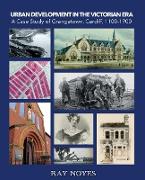- Start
- Urban Development in the Victorian Era
Urban Development in the Victorian Era
Angebote / Angebote:
From desolate marsh to a desolate town - from William the Conqueror to Queen VictoriaGrangetown is a district to the southwest of the city of Cardiff, bounded by the rivers Taff and Ely and the Severn Estuary. It is an area of terraced housing, small industries and commercial outlets, besides boasting a comprehensive range of social facilities. Its architecture is clearly Victorian, but why was it built in that period and who was behind it? Just as interesting, what was there before any construction was contemplated?To answer the latter question, over 800 years the area passed through the hands of various lords, bishops, farmers, and even monks. It was the monks of Margam Abbey who turned what had been desolate, tidal marshland into a productive grange. After the Dissolution of the Monasteries, the area was parcelled up into tithed land which was bought by successive generations of gentry and investors. Eventually, it came into the hands of the third Marquis of Bute and the Windsor-Clive families, both of whom were locked in competition for wealth-creation through the construction of the ports of Cardiff and Penarth.The Industrial Revolution and in particular the mid-Victorian period offered great opportunities for investment. Money was cheap, innovations and inventions abounded, and after the Great Exhibition confidence in Britain and its inventiveness reached its zenith. This was the moment the Windsors cast their investments at the desolate marshy grange as a means of housing the many workers needed for their new harbour, docks and railways and the ancillary industries it was hoping would arise on adjacent land. The area to be known as Grangetown was constructed simultaneously with the working class areas of Penarth and its docks and harbour, and was considered very much a part of it.By definition, building on a marsh was not to be easy. Once begun, for those living on the marsh, life would not be easy either. The initial phases of housing were poor and residents' health suffered. Outbreaks of cholera and typhoid ravaged the area. The failure of some industrial ventures brought unemployment. Sewerage systems failed. Fresh water sources were polluted. Grangetown came to be known for its failing infrastructure, chronic disease, crime and homelessness. Eventually, the Borough of Cardiff rested the area from its constructors and investors, and brought it under the administration of Cardiff.To the creators of Grangetown this was an affront and Cardiff's takeover bid was resisted. The streets of impoverished, terraced houses became the focus of a struggle for power and influence not only between the two great families of the Butes and the Windsors, but also between the elected councils of Penarth and Cardiff, all this occurring against a background of unparalleled wealth created by the great docks the two families had created.
Folgt in ca. 15 Arbeitstagen
